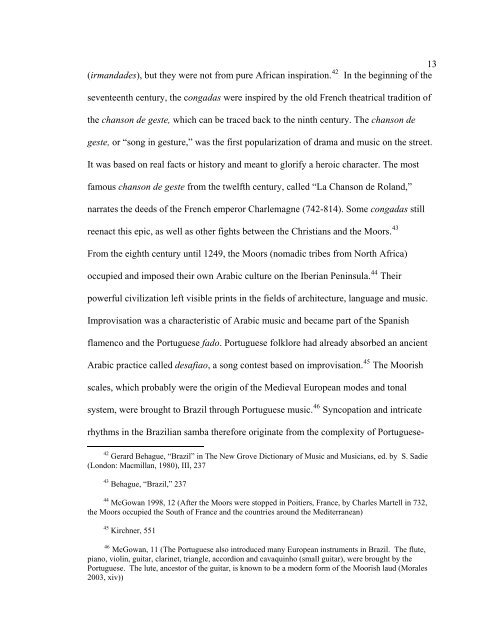BRAZILIAN MUSIC AND SOCIAL CONSCIOUSNESS: - Elisabeth Blin
BRAZILIAN MUSIC AND SOCIAL CONSCIOUSNESS: - Elisabeth Blin
BRAZILIAN MUSIC AND SOCIAL CONSCIOUSNESS: - Elisabeth Blin
Create successful ePaper yourself
Turn your PDF publications into a flip-book with our unique Google optimized e-Paper software.
13<br />
(irmandades), but they were not from pure African inspiration. 42 In the beginning of the<br />
seventeenth century, the congadas were inspired by the old French theatrical tradition of<br />
the chanson de geste, which can be traced back to the ninth century. The chanson de<br />
geste, or “song in gesture,” was the first popularization of drama and music on the street.<br />
It was based on real facts or history and meant to glorify a heroic character. The most<br />
famous chanson de geste from the twelfth century, called “La Chanson de Roland,”<br />
narrates the deeds of the French emperor Charlemagne (742-814). Some congadas still<br />
reenact this epic, as well as other fights between the Christians and the Moors. 43<br />
From the eighth century until 1249, the Moors (nomadic tribes from North Africa)<br />
occupied and imposed their own Arabic culture on the Iberian Peninsula. 44 Their<br />
powerful civilization left visible prints in the fields of architecture, language and music.<br />
Improvisation was a characteristic of Arabic music and became part of the Spanish<br />
flamenco and the Portuguese fado. Portuguese folklore had already absorbed an ancient<br />
Arabic practice called desafiao, a song contest based on improvisation. 45 The Moorish<br />
scales, which probably were the origin of the Medieval European modes and tonal<br />
system, were brought to Brazil through Portuguese music. 46 Syncopation and intricate<br />
rhythms in the Brazilian samba therefore originate from the complexity of Portuguese-<br />
42 Gerard Behague, “Brazil” in The New Grove Dictionary of Music and Musicians, ed. by S. Sadie<br />
(London: Macmillan, 1980), III, 237<br />
43 Behague, “Brazil,” 237<br />
44 McGowan 1998, 12 (After the Moors were stopped in Poitiers, France, by Charles Martell in 732,<br />
the Moors occupied the South of France and the countries around the Mediterranean)<br />
45 Kirchner, 551<br />
46 McGowan, 11 (The Portuguese also introduced many European instruments in Brazil. The flute,<br />
piano, violin, guitar, clarinet, triangle, accordion and cavaquinho (small guitar), were brought by the<br />
Portuguese. The lute, ancestor of the guitar, is known to be a modern form of the Moorish laud (Morales<br />
2003, xiv))


